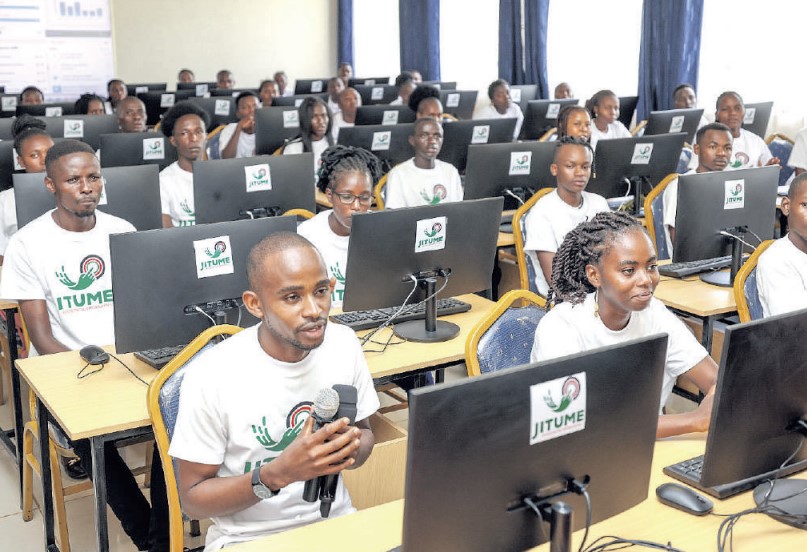

ARTICLE BY CALEB MWAMISI
In my recent reflections, I emphasised the urgency of confronting two corrosive trends in Kenya’s digital landscape: youth’s growing addiction to superficial online content and the toxic, often destabilising nature of online discourse driven by “keyboard assassins”.
These trends, while symptomatic of deeper societal issues, also starkly remind us of how the digital age can serve as both a barrier and a bridge to development.
As we stand at the crossroads of technological transformation, the question is not whether Kenya can harness the digital economy, but how it can do so in a way that is inclusive, innovative, and impactful.
Kenya’s digital journey has been nothing short of remarkable.
From leading the world in mobile money innovation with M-Pesa to hosting Africa’s most ambitious smart city project at Konza Technopolis, the country has firmly established itself as a pioneer in the digital space.
By 2023, internet penetration in Kenya had reached 88.4 percent, reflecting the rapid pace of connectivity. However, this growth masks significant disparities in access and utilisation.
For every urban youth engaging in the gig economy, there is a rural counterpart struggling with limited access to devices, affordable internet, and digital literacy.
Addressing this digital divide is crucial if we are to ensure that no Kenyan is left behind in the digital revolution.
The government, under President William Ruto, has made commendable strides in recognising and investing in the digital economy as a pillar of national development.
One transformative initiatives is the partnership with the World Bank to roll out broadband infrastructure to underserved regions, an investment worth $485 million (Sh62.68 billion).
This project aims not only to connect homes and businesses, but also to open up new avenues for education, healthcare, and commerce in areas long been excluded from the country’s growth narrative.
Beyond infrastructure, the Ruto administration has also doubled down on digital skills development.
The Ajira Digital Programme stands out as a flagship initiative, equipping young people with the skills they need to participate in the global gig economy.
More than a million Kenyans have already benefited from this programme, which off ers training in freelancing, digital marketing, and data entry, among other fields.
But this is only the beginning.
The real challenge lies in preparing youth for high-value, future-focused industries such as artificial intelligence, robotics, and fintech.
These industries will define the global economy in the coming decades, and Kenya must position itself as a key player.
Konza Technopolis, often described as Africa’s Silicon Valley, is another bold statement of Kenya’s digital ambitions.
This smart city project will create a hub for innovation, education, and business, attracting both global tech giants and local startups.
While still under development, Konza has the potential to transform Kenya’s digital economy by creating thousands of jobs and fostering a culture of research and innovation.
However, its success will depend on sustained political will – which the government has demonstrated – robust governance structures, and meaningful engagement with local communities to ensure the benefits are widely shared.
Digitisation is also revolutionising public service delivery. Platforms like eCitizen, which the President recently directed ministries and agencies to adopt and issued ultimatums, are streamlining government processes, reducing inefficiencies and curbing corruption.
The rollout of digital IDs will further enhance financial inclusion, enabling more Kenyans to access banking services and credit facilities.
These initiatives demonstrate the transformative potential of technology in improving governance and empowering citizens.
Yet, they also highlight the importance of ensuring that these platforms are accessible, secure, and transparent.
Despite these advances, challenges remain.
The cost of internet access and devices continues to be a major barrier, particularly for low-income households.
Cybersecurity threats are on the rise, and fraud, data breaches, and cyberbullying pose significant risks.
Moreover, the cultural challenges I previously highlighted — the lure of shallow content and the toxicity of online discourse — remain persistent threats to the promise of the digital economy.
Changing these cultural dynamics will require a concerted effort to promote digital literacy, critical thinking, and ethical online behaviour. Leadership will be the lynchpin in overcoming these challenges.
President Ruto’s government has laid out a clear vision for Kenya’s digital future, but realising this vision will require collaboration across sectors.
The private sector has a critical role in funding technological innovation and providing mentorship opportunities for young tech enthusiasts. Civil society must advocate inclusive policies that prioritise access and equity.
International partnerships can bring in the technical expertise and investment needed to scale up Kenya’s digital economy.
The digital economy is not just an economic opportunity; it is a lens through which we can reimagine Kenya’s future.
It is a chance to address historical inequalities, create jobs, and build a more transparent and inclusive society.
But it is also a test of our collective resolve to confront the challenges that come with progress.
Our nation’s resilience, creativity, and entrepreneurial spirit have brought us this far, and we should have no doubt that they will carry us forward into a brighter digital age.
By harnessing the opportunities before us, addressing the barriers, and fostering a culture of innovation and responsibility, Kenya can lead not just Africa but the world in the digital economy.
The potential is
immense, and the time to act is now.


